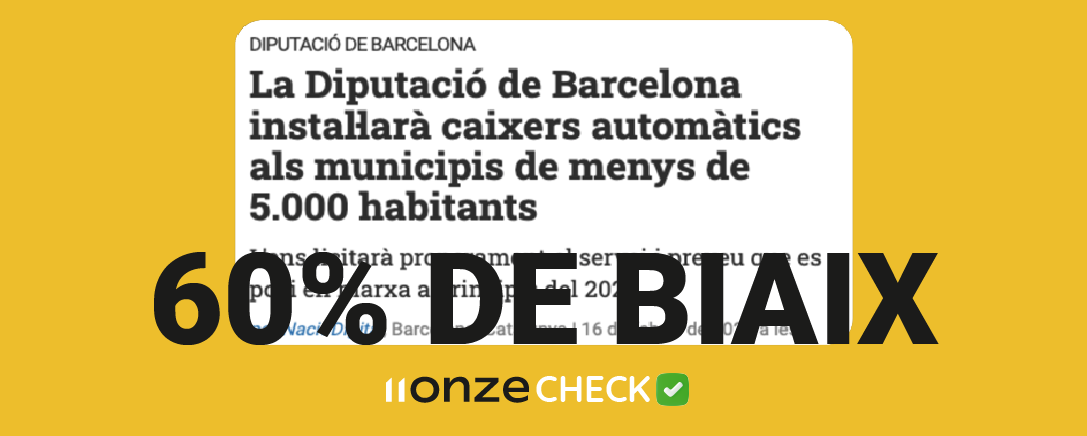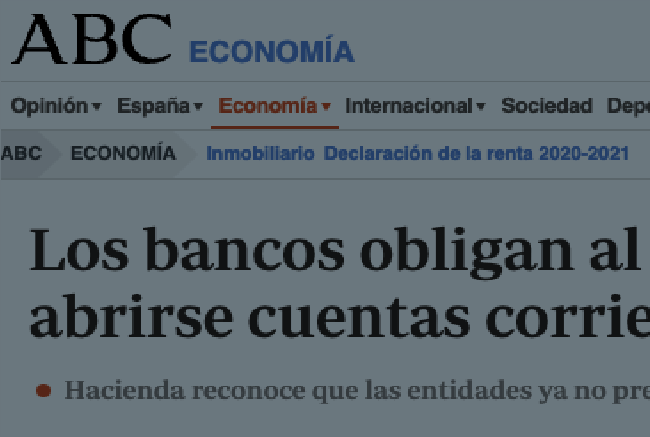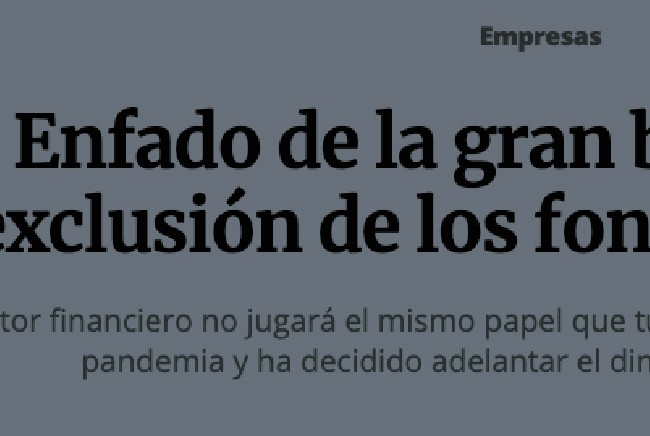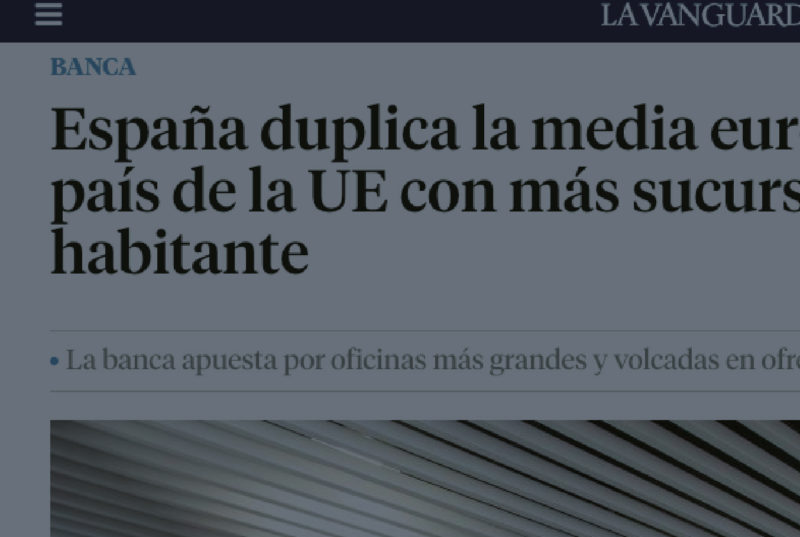

11Onze Check: replacing ATMs with public money?
The Diputació de Barcelona has announced that, in order to stop the financial exclusion of rural areas caused by the massive closure of bank branches, it will issue a tender to banks to install cashpoints in municipalities with less than 5,000 inhabitants. At 11Onze Check we analyse the news published by ‘Nació Digital’ with the Bias Method, and we ask ourselves if it is ethical to pay with public money a tender that will give even more profits to the banks to replace the cashpoints they have eliminated.
The inexorable closure of bank branches by Spanish banks is shaping a new scenario where cashpoints are in a process of extinction. Urban centres, but especially rural areas, watch helplessly as the closure of branches and the loss of banking services continues unabated. This dwindling density of the banking network is aggravating the financial exclusion of a large part of the population, especially the elderly, who feel stigmatised and despised by the traditional banks.
Complaints from users prompted the Bank of Spain and the state government to urge banks to find alternative solutions to guarantee access to cash, but these have proved insufficient. Even so, the affected municipalities are doing what they can. Some have decided to go head-on and hit the banks in their pocket. In El Vendrell, the council will raise taxes on banks that do not provide customer service to the elderly in person.
The town council of Móra la Nova has decided not to contract any more services with BBVA, in response to the bank’s reduction in services to its customers. “It is unacceptable that banks are increasingly neglecting those affected by the digital divide. Our older citizens deserve to be properly attended to, not abandoned,” emphasised the mayor of Móra la Nova, Francisco X. Moliné.
On the other hand, the Generalitat del País Valencià and the Diputació de Barcelona will act on their own by investing public money to install cashpoints in depopulated areas. These tenders, at the expense of the town councils, will increase the millionaire profits of the same banks responsible for the unsustainable lack of branches.
At 11Onze Check we take all these factors into account when analysing how the article in ‘Nació Digital‘ explains the reasoning behind the Diputació de Barcelona’s tender, and we explain why we determine that it is 60% biased.
SOURCES
In the article, we find a series of statements by Josep Arimany of the Diputació de Barcelona. The news item merely repeats statements found in the Diputació’s press releases, but the voices of other actors involved in the process are missing. There is no statement from the mayors of the municipalities that will subsidise part of the cost of this tender, nor is there any statement from the representatives of the banks or neighbourhood associations.
CONTEXT
The article leaves out key elements that would help the reader understand why this situation has come about. For example, there is no mention of the report that the Bank of Spain published on 4 August 2021, where it urged banks to take alternative measures to guarantee access to cash. Nor does it explain how these solutions have not been applied throughout the territory and have proved insufficient, urging the state government to demand a new plan from the banks to guarantee financial inclusion.
FOG
The information is foggy because it normalises a bidding process at the taxpayer’s expense that is anything but normal. Councils that assume an extra cost that should not correspond to them, especially if we take into account the profits of the banks and their role in creating the problem that the Diputació de Barcelona wants to solve with these measures.
ENDOGAMY
The article presents the position of the Diputació de Barcelona without questioning its action plan or possible alternatives. Nor is there any reference to the composition of the political representation in the Plenary of the Diputació and the conflict of interests between these political parties and the banks, which could explain why it is taken as a fait accompli that the city councils have to take charge of subsidising the banks.
INTENT
No mention is made of users’ complaints with the signature campaign, nor is there any mention of the banks’ record profits. The article limits itself to repeating the statements by MP Josep Arimany assuring that “the Diputació will be ‘rigid’ with the conditions it will demand from the banks to win the tender”, without specifying the conditions. On the contrary, it gives the impression that the aim is to justify the unjustifiable, but without providing any argument that would lend credibility to a tendering process that, a priori, seems biased in favour of the banks.
VOCATION OF SERVICE
The willingness to serve the public interest is called into question when the article simply describes a bidding process and states that the viability of the project is only possible if the Diputació and the town councils assume the cost of the project, without even questioning the possibility of sharing the cost with the banks.
To know more about the Bias Method that we have used to check this information, you can find it here. If you would like to send us economic information to verify, you can do so by writing to us at [email protected].
If you want to know more about superior options to make your money profitable, go to Guaranteed Funds. From 11Onze Recomana we propose you the best options in the market.






👌
Gràcies, Carles!!!
I qué tal si la DIBA recupera la Caixa d’ Estalvis que tenia fins als anys 70 del segle passat i ho fa ella mateixa? informarà la DIBA del cost públic que suposarà aquesta iniciativa?
Bones preguntes, Joan! Haurem d’esperar per veure com acaba, el tema. Gràcies per les teves reflexions! Seguim endavant!
Fantàstic mètode del biaix! De tant en tant el repasso per a poder aplicar-lo a altres tipus de noticies!
Gràcies, Josep! Celebrem que el trobis útil.
No arribo a entendre, com aquest servei s’ha de dur a terme amb diners públics. Quan es tracta d’una activitat privada, la qual ha estat rescatada i en l’actualitat estan donant beneficis, dels quals ni 1€ es destina a tornar el rescat rebut, sinó a retribuïr als seus accionistes amb dividends. Quina vergonya.
Moltes gràcies per la teva reflexió sobre aquest article, Manuel
👏
Gràcies, Daniela!😉
Doncs sí, pensevq aquests caixers els haurien de pagar els bancs, ja que són els responsables.
Doncs sí, Jordi; això fora el just. Però la banca tradicional encara té un poder desmesurat a la nostra societat. Esperem que, de mica en mica, això vagi canviant. Gràcies per la teva reflexió!
Conxorxa a tres bandes : Mitjans de comunicació venuts, classe política corrupta, la DIBA és un cas flagrant d’opacitat i clientelisme que passa desapercebut, i la gran Banca, que farà posat de be tot i actuar com un llop. La majoria s’ho empassarà perquè és una declaració populista i cridanera.
La reflexió “reposar caixers amb diners públics? no la veurem en cap mitjà.
Gràcies, com a mínim podrem discutir, si es presenta el cas. Alguna llavor es pot sembrar.
Hi coincideixo del tot, Mercè. Gràcies per les teves reflexions, que sempre toquen el moll de l’os!
Emprar “El Biaix” com a eina d’anàlisi m’està ajudant molt
Gràcies, Francesc. Continuem endavant!
👌
Gràcies, Joan!🙏🏾
El de sempre el segon cop que es rescataria la banca ,i el projecte d’estat del decaleg de les obligacions de la banca ,quedarà tb amb paper mullat
La banca sempre guanya
Fins ara, sempre guanya. Treballem per a què això canviï, com més aviat millor. Gràcies per la teva reflexió, Alícia!